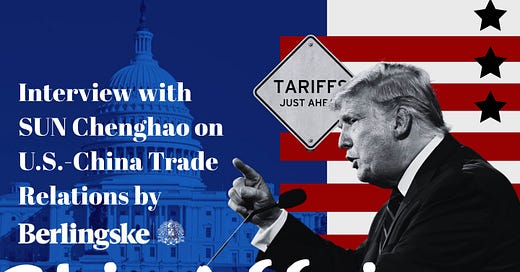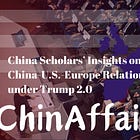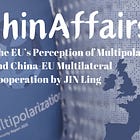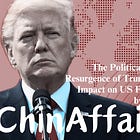Interview with SUN Chenghao on Tariff War and China-US Relations by Berlingske
Dialogue between China and the US is needed more than ever. But for that to happen, Trump must realise that China is standing firm.
Hello everyone, and welcome to the special edition of the ChinAffairsplus. Lately, Trump’s tariff policies have brought significant volatility to China-U.S. relations, drawing close attention from countries around the world. Observers are watching to see whether the two sides will respond tit-for-tat, engage in strategic bargaining, or if one side will ultimately back down.
In recent days, I have been interviewed by several media outlets from Europe and the United States. The main topics of discussion have revolved around the tariffs between China and the U.S., such as the outlook of the tariff or trade war, the impact of tariffs on China, and whether a deal is still possible between the two countries. Among them, I had an interview with Berlingske, where I had an interesting conversation with Alexander Sjöberg. Through these interviews, I hope to help more people understand the logic behind China’s policies. However, I sincerely hope that economic globalization will not come to an end due to the current fluctuations, as such an outcome is something that no one desires or can accept.
The original article was written by Alexander Sjöberg, Asia correspondent with Berlingske, and the following is the English version authorized by Berlingske for our newsletter:
There is an urgent need for a meeting between China and the leaders of the United States.
But for that to happen, China has a requirement.
‘The format of the dialogue is not the most important thing.’
‘What matters is whether both sides approach the talks with sincerity and a genuine willingness to make progress on issues of common interest.’
‘Before the meeting, both the US and China must work together to ensure that there is a good, friendly and honest atmosphere for the meeting.’
So says Sun Chenghao, fellow and head of the US-EU programme at the Center for International Security and Strategy (CISS) at Tsinghua University, in an interview with the Danish daily Berlingske, a major newspaper in Northern Europe.
Sun Chenghao reveals how China views Trump and the serious situation the two superpowers find themselves in after the start of the trade war.
But also how they fear the rise of far-right forces.
Trump ‘has underestimated China’
There is no doubt about the basic attitude towards Trump in China, says Sun Chenghao.
The confrontational style of the Trump administration, which we saw unfold during the meeting with Ukrainian President Zelensky and which is playing out in full force in the trade war between the two superpowers, will not bring Xi to his knees.
The US president will have to behave if he wants to engage in dialogue with Xi and the Chinese government.
‘While Trump hopes to pressure China into a deal through tariffs, he has probably underestimated China's resolve and resilience,’ says Sun Chenghao, who continues:
‘The US should especially avoid sending mixed signals, such as expressing willingness for dialogue on the one hand, while promoting sanctions and other forms of pressure against China on the other.’
Trump’s ‘offensive’ approach shows that he has a clear expectation that the other side will pay, says Sun Chenghao - and that's not going to happen with China.
The US faces ‘significant challenges’
Tsinghua University is located in China’s capital, Beijing, and is the most famous educational institution in the country. It is where China’s most important leaders have studied, including Xi Jinping, and it is from here, and with a background as a former fellow at Yale in the US, that analyst Sun Chenghao speaks.
Sun Chenghao has an eye for both the US and Europe’s view of China, but can also act as our translator when we want to understand China’s view of us. The latter is exactly what the analyst has agreed to help with - but not on behalf of the Chinese state or the Communist Party.
Sun Chenghao’s words are his own, he emphasises.
However, it is clear that much of what he has to tell us is more or less in line with the Communist Party line.
Last weekend, China’s Foreign Ministry called the US and Trump a ‘destabilising force’. The response to Trump’s harsh tariffs has been a similar backlash, with the Chinese government criticising the US for ‘bullying’ and ‘bully tactics’.
The Chinese embassy in the US shared a video of Ronald Reagan praising global free trade, as if to remind Trump of where his own Republican Party comes from. The State Department shared a video of former leader Mao Zedong calling for a fight ‘no matter how long this war will last’.
No, it’s not far from there to Sun Chenghao’s views and his main point:
‘The US-led world order has faced significant challenges in recent years,’ he says. Because Sun Chenghao does not believe that it was Trump who killed Pax Americana.
For years, the US has been in global retreat, if the US-led world order ever existed at all, he says rhetorically.
‘World peace does not depend solely on how the US acts,’ Sun Chenghao believes, and Trump is now accelerating the US withdrawal.
The ‘politics of power’ has returned
According to Sun Chenghao, there is a broad consensus in the Chinese intelligentsia on what Trump’s policies are.
‘He prioritises “American First”, believes that “might is right”, and this can generally be described as a form of transactional realism,’ says Sun Chenghao, whose analysis is in some ways surprisingly similar to what many European commentators would say.
According to the Chinese scholar, Trump has so far been relatively cautious towards China. The focus has been on the war in Ukraine and domestic politics.
The trade war has completely changed that picture, and now the scope of the conflict is growing. Both China’s academics and political experts expect continued challenges and uncertainty, says Sun Chenghao, who continues:
‘The election of Trump signals a clear return to power politics, not only in the US-China relationship, but in the wider international landscape.’
According to Sun Chenghao, the situation now calls for a centralized Chinese crisis response to handle emergency communications with the US in an attempt to avoid a confrontation between the two countries.
Speaking to the South China Morning Post, China experts are now saying that only well-executed diplomacy can save the two countries' relationship.
China will not remain passive
But it’s not just US foreign policy that has Sun Chenghao and China’s attention, because according to the analyst, the rise of populism and far-right forces in the US is being watched with concern.
‘This could pose a danger to China,’ says Sun Chenghao.
While the developments are not exclusively about China, the US designation of the country as a ‘strategic adversary’ has created a renewed hatred of Chinese people, says the analyst, and this gives more room for stories about TikTok being a threat to democracy and China controlling the Panama Canal.
All of which Sun Chenghao believes is wrong.
Trump's tariff war and claims on Greenland also show how Trump is willing to go to great lengths to get his way. Even if billions go up in smoke.
In China, Trump’s tariffs have been met with strong countermeasures by the government, while the regime’s propaganda department and state media portray Trump's America as greedy, unfair and dangerous.
The Chinese government is now exploiting the geopolitical vacuum left by Trump to lure international companies back to the country, Berlingske recently wrote, and new overtures between Brussels and Beijing confirm the trend.
The contours of a new relationship are emerging.
In the words of Sun Chenghao, there is no doubt about what is going on:
‘China has not remained passive in the face of Trump's heavy-handed approach, but has instead responded with firm, restrained and targeted countermeasures.’
Sun Chenghao himself does not give any indication of how the trade war will end, but China will respond decisively, he says.
He also believes that Trump expects China to ‘pay’.
But the Trump administration must wake up and realise that China has red lines and that the price of trying to force a deal will be high, Sun Chenghao warns.
The most important relationship in the world
The analyst therefore also believes that the perception in China is that it has a ‘positive’ approach to dialogue with the US.
It wasn’t China that started the trade war. It was Trump.
China’s government has learnt from Trump's first term in the White House and Beijing has ‘repeatedly stated that the China-US relationship is one of the most important bilateral relationships in the world today,’ says Sun Chenghao, who continues:
‘Both sides need to increase mutual understanding and avoid confrontation.’
This applies to the trade war - and it applies militarily.
The US Secretary of Defence, Pete Hegseth, launched a strategy a few weeks ago that unambiguously points the country's military power in the direction of the Pacific - and China.
Conversely, China's People's Liberation Army has increased pressure on America's friends in Taiwan and the Philippines. At the same time, Beijing has expressed strong opposition to US alliances in the region.
The hope of a meeting
Anyone who observes the two countries’ relationship knows all about these issues, and so does Sun Chenghao, but he believes that the US can act ‘rationally’ and avoid further escalation if its leadership wants to.
‘Trump’s team does not want to provoke a military conflict with China over issues such as the Taiwan issue or the South China Sea,’ says Sun Chenghao.
‘It will not serve the interests of either side,’ he reasons - and his conclusion is clear:
‘A meeting between Chinese and American leaders is absolutely necessary.’
‘We also hope that the dialogue will be result-oriented and expand the areas of cooperation while narrowing the so-called “competition areas”,’ says Sun Chenghao.
He is ‘optimistic’ about the prospects for such a meeting.
‘Even as the US will increase pressure on China, Trump will be careful not to cross certain red lines,’ he believes.
Until recently, analysts were predicting a possible ‘birthday summit’ between Xi and Trump to coincide with their respective birthdays in June, while others have been talking about a meeting in May.
All that has now been thrown up in the air by Trump's trade war.
A new world order is born
According to Sun Chenghao, the preliminary conclusion of Trump’s election is that the world has a new understanding.
We live in a multipolar age where no one country can dominate all the others, which is why Trump’s attempt to lure Russia away from China - the so-called ‘reverse Nixon’ strategy - is doomed to fail, Sun Chenghao believes.
The two countries’ relationship is not defined by the US, says the researcher.
The US is no longer at the centre of everything that goes on.
His assessment is therefore clear:
‘If the US puts too much emphasis on ‘America first’ at the expense of other countries' interests, and resorts to military deterrence, containment and other measures to hinder other countries' normal development and defend so-called ‘American dominance’ through heavy-handed tactics, it is unacceptable to China.’
A pragmatic choice rather than a grand plan
From Beijing’s perspective, the US must understand that it must treat others as equals, and Sun Chenghao notes the Munich Security Conference this year. The one where J.D. Vance gave Europe an overhaul.
Less talked about is that the conference had ‘multipolarity’ as its theme.
‘Pessimists fear it will lead to more turbulence and disorder, while optimists believe it can strengthen the voice of developing countries and contribute to a fairer and more dynamic multilateral international order,’ says Sun Chenghao, who continues:
‘China belongs to the latter group.’
‘I believe that the US’s lack of global leadership and its alignment with various alliances will create space for China, Europe and other countries to improve their relations and achieve cooperation.’
‘This is not a “grand strategy” that China or other countries have actively planned, but rather a pragmatic choice that all parties have made based on their own interests.’
The original report: https://www.berlingske.dk/internationalt/trump-undervurderede-xi-vil-han-i-dialog-er-der-kun-en-vej-frem-han










